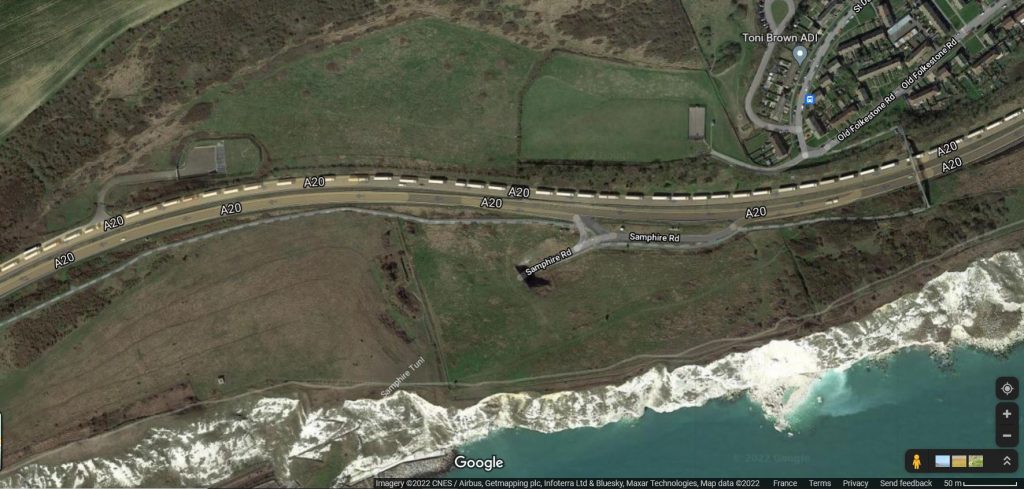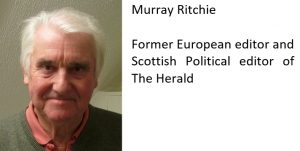Brexit is causing a curious stasis in UK politics in the four constituent nations. It is as though no-one really knows what to do next, writes Murray Ritchie.
2022 looks like being the year that exposes the true extent of Brexit’s damage to the United Kingdom. Until now the government of Boris Johnson has been able to hide Brexit’s failures behind the cost of Covid. But not for much longer.
Britain’s new foreign secretary, Liz Truss, is talking tough as she prepares to tackle the problem of Brexit’s Northern Ireland protocol. Above all, this is the difficulty that bedevils UK-EU relations. An agreed solution would be helpful but appears almost impossible.
For starters, she is threatening to invoke Article 16 which would undermine the entire relationship between the European Union and the UK. But we have known that all along.
So much depends on Brexit being a success for the increasingly unpopular Conservative government which is now growing terrified of its failures becoming a ruinous electoral embarrassment. Article 16 is now just another area where Brexit’s toxins are seeping into everyday life – from farming to fisheries, from trade to the soaring cost of living, and into the very fabric of the country, the creaking constitution.

And yet, just when you least expect it, Brexit is causing a curious stasis in UK politics in the four constituent nations. It is as though no-one really knows what to do next.
The opposition Labour Party looks on with bemusement, apparently afraid to take a stand against a failing Tory government for fear of upsetting its own Brexit supporters. While polls suggest a small majority of people now view Brexit as a mistake, you could be forgiven for thinking Labour would take the opportunity to put the boot in.
The obvious question is this: if pro-EU Northern Ireland can remain closely aligned to the European single market, why not the even more pro-EU Scots?
But no. Sir Keir Starmer, Labour leader, talks only of a new constitutional settlement for the whole UK – an old song – to tempt the awkward pro-EU Scots back into the Labour fold. He knows Labour cannot win back Britain without Scotland. Yet he offers nothing new or exciting to tempt those who long ago switched to the Scottish National Party.
Meanwhile, Scotland’s governing nationalist party, still bent on independence, also seems curiously muted, save for the occasional reminder that one day – far in the future – Scotland might rejoin the EU. Brexit, it seems, imposes crushing political caution to the point of leaving all politicians stumped.
Most immediately, what happens in Northern Ireland matters to Scotland. The obvious question is this: if pro-EU Northern Ireland can remain closely aligned to the European single market, why not the even more pro-EU Scots?
You might think Nicola Sturgeon, the popular SNP leader, would be hammering home the point. After all she seems unassailable electorally and polls show a small majority for independence. But a fear seems to lurk there that, if the English Tories were to agree to Scotland returning to the single market, her own supporters might settle for that instead of independence.
How strange that Boris Johnson has not thought of that too. Or, if he has, why does he prefer to chunter on about the UK’s “precious union” of nations with no hope of winning over Scotland?
Allowing Scotland to rejoin the single market would, of course, infuriate his right-wing Eurosceptic MPs who dream of a low-tax, unregulated UK thumbing its nose at Brussels – but they are in a state of permanent fury these days anyway, what with Johnson’s sky-high public spending and Labour-style rising tax rates. You might think Boris had little to lose.
It’s a given that Scotland returning to the single market and customs union would be popular in Scotland for any political party, including the Scottish Tories who are keen to distance themselves from Johnson whom they see as a constant embarrassment.
Tories in England and a few last-ditch Unionists in Scotland would object, of course, claiming this would mean a hard border and there are arguments aplenty about how that would make life difficult for mainland Britain. But slowly that argument is being broken down.
Much head scratching is being done in the nation’s debating chambers about how a hard border can be overcome. Logic dictates that having seen it can be done sensibly between, for example, Norway and Sweden, or between Switzerland and its four EU neighbours, then it can be done between Scotland and England.
All it takes is political will. Northern Ireland might be about to reinforce that theory.
Article 16 is now just another area where Brexit’s toxins are seeping into everyday life – from farming to fisheries, from trade to the soaring cost of living, and into the very fabric of the country, the creaking constitution.
The test is coming. If Liz Truss agrees that Northern Ireland remains effectively in the single market, then it follows that the European Court of Justice will have authority there. Britain seems to have accepted that already. The EU will insist on nothing less. This means an integral part of the United Kingdom bowing to the ECJ – and if that is the case, why not Scotland?
Perhaps this is why Truss – known more for her unabashed ambition than any diplomatic ability – is threatening to put the kybosh on the whole protocol.
Meanwhile Brexit continues to spread economic difficulty in the UK and the EU knows it. Brussels appears in no mood to compromise.
According to Maros Sefcovic, the European Commission vice president, in charge of inter-institutional relations, the protocol “touches on the fundamentals of our relationship” with the UK.
The political relationship between Britain and France is the worst I have known it in 40 years as a diplomat. A recent Harris Poll shows that this sour mood is now affecting public opinion in France, with only 40% of respondents seeing the UK as an ally. https://t.co/H4hnU9U4qO
— Chief-Exec.com (@Chief_Exec_com) January 23, 2022
He takes the view that, because the protocol was the most complicated part of the Brexit negotiations and is the foundation of the entire deal, it could cause the whole system to collapse. “We must prevent that at any cost,” he said.
At the forefront of everyone’s mind is the Good Friday Agreement which brought peace to Northern Ireland and which would be imperilled with potentially horrific consequences if no political compromise is reached.
In which case we might conclude that, if you think Brexit is damaging now, you ain’t seen nothing yet.





